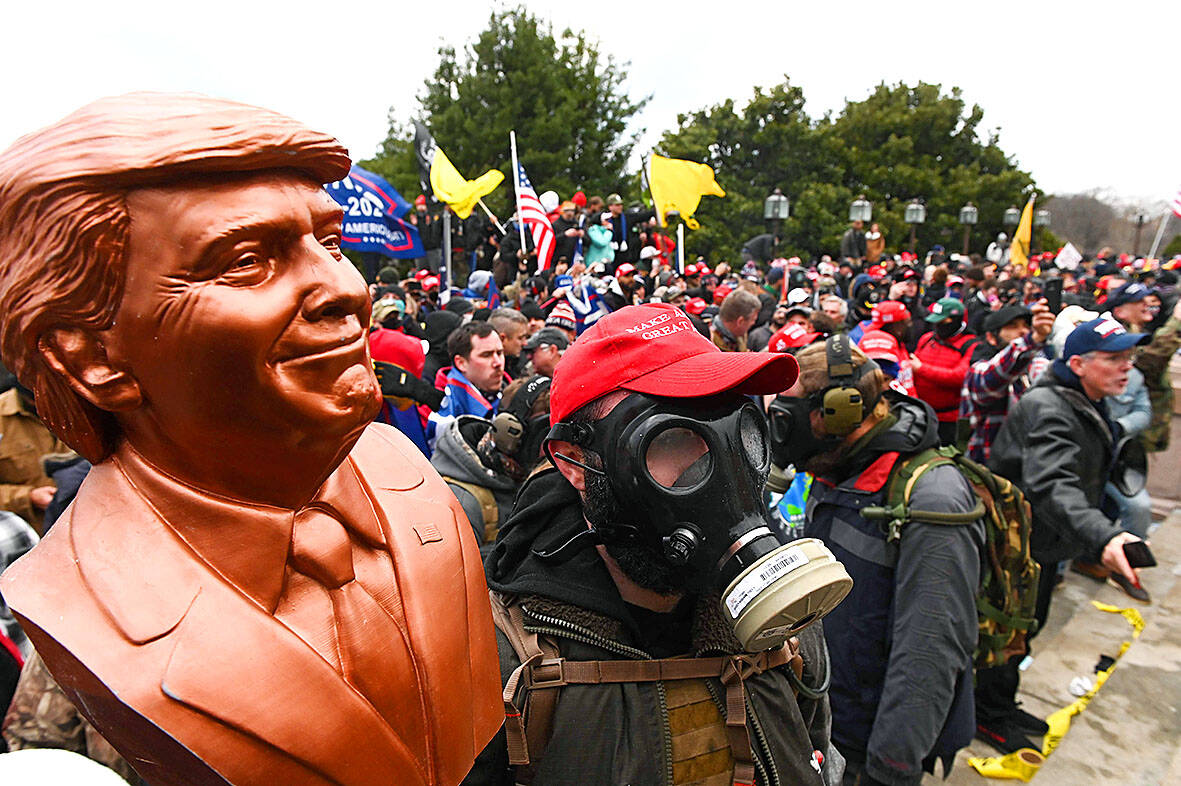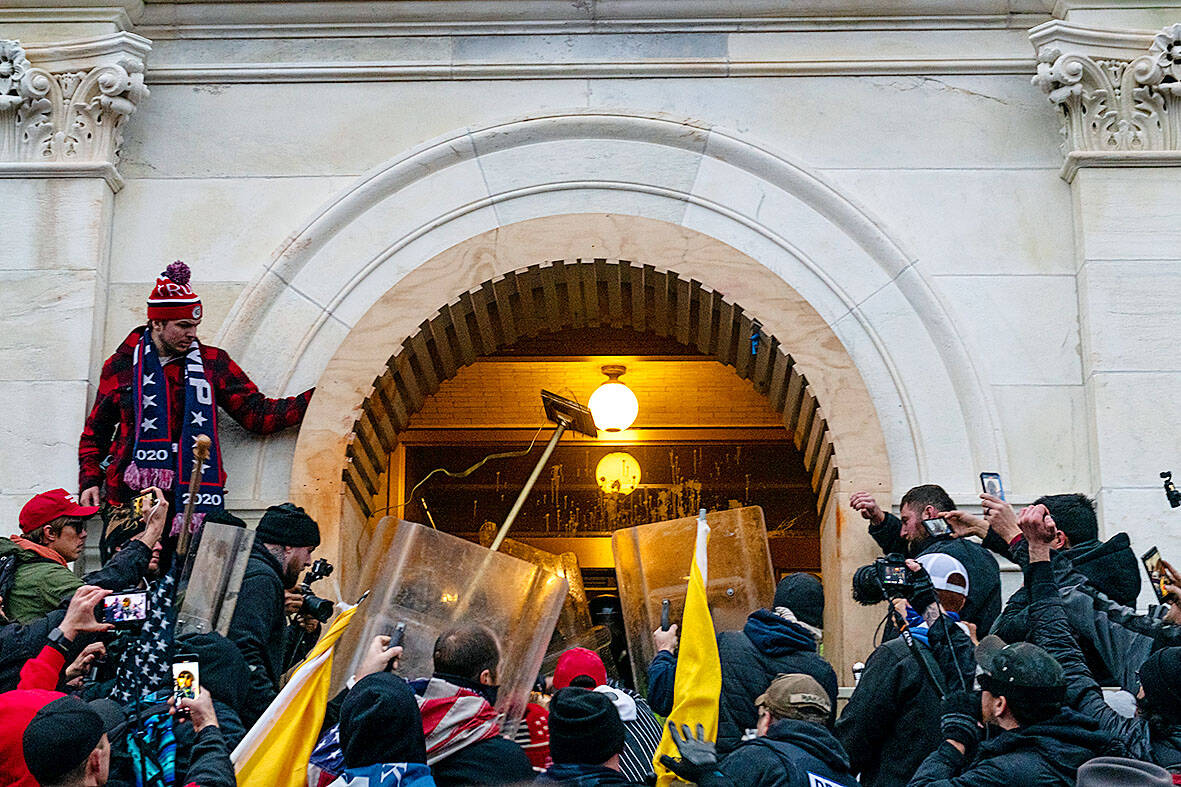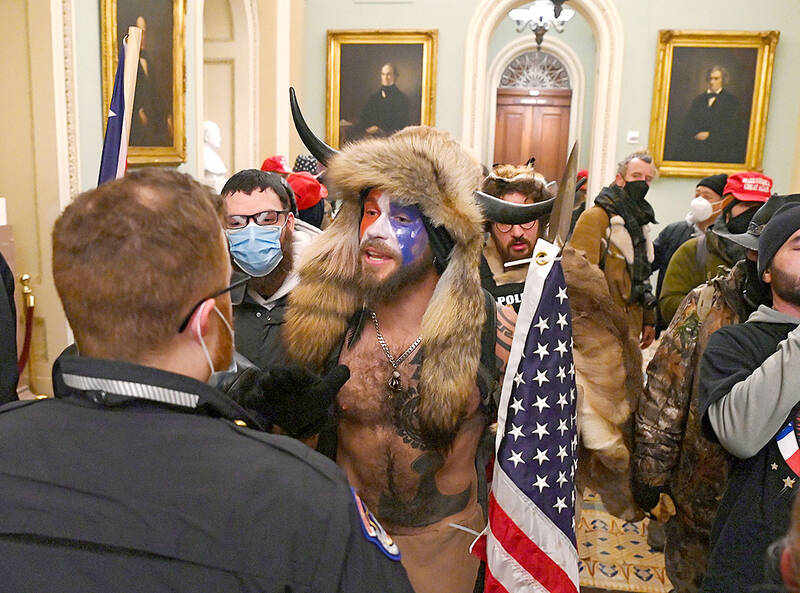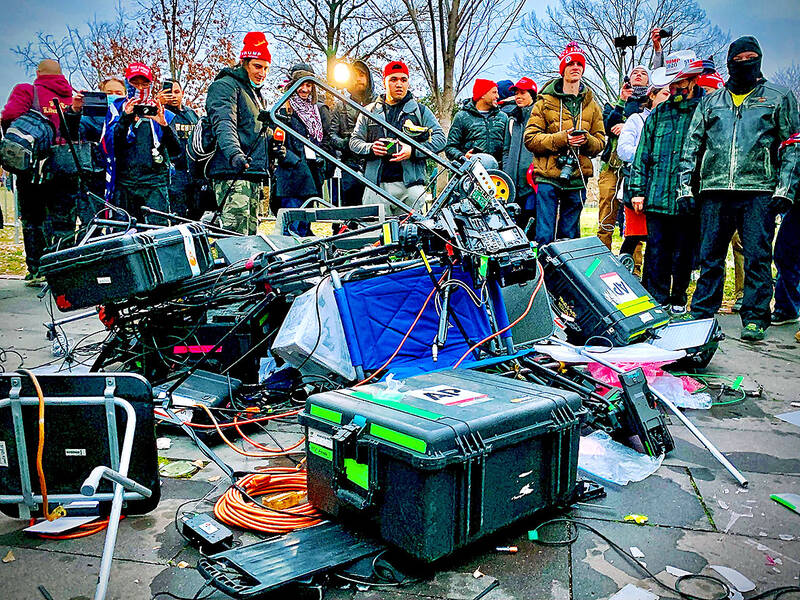It is Jan. 6, 2025, and the US president looks on in horror as his narrowly defeated rival calls on the armed forces to help overthrow the “fraudulent” election result.
The scene is from War Game, a new documentary premiering at the Sundance film festival on Tuesday in which real former government and military officials take part in an unscripted role-play exercise imagining another assault on the Capitol.
But for its directors, the scenario — which echoes the events of Jan. 6, 2021, except that this time, rogue police and soldiers defect to join protests, which spread nationwide — is not so far-fetched.

Photo: AFP
“It’s terrifying how timely the film continues to become,” said co-director Jesse Moss.
“And I do worry about how timely it may yet be one year from now.”
In the film, former Montana governor Steve Bullock assumes the role of US president, who has six hours to decide how to confront the rapidly escalating coup attempt.

Photo: Bloomberg
His advisors are played by real-life US senators, FBI and CIA officers, military colonels and a former NATO commander.
They gather in an elaborate war room — the set was inspired by Stanley Kubrick’s Dr. Strangelove — and receive updates from intelligence briefings, social media and a fictional rolling news channel.
“This was, for six hours, a real experience for all of us,” Bullock said. “It was a stressful environment... nobody was thinking about the cameras being there,” he added.

Photo: AFP
‘DISTURBING’
Simultaneously, a fictional paramilitary group called the “Order of Columbus,” played by former US veterans, are gathered elsewhere, sowing disinformation online and encouraging soldiers to break ranks.
The role-play exercise was originally inspired by a Washington Post op-ed written by three US generals in 2021, which warned of growing extremism within the armed forces, and urged the military to prepare for possible insurrection after this year’s election.

Photo: AFP
“A disturbing number of veterans and active-duty members of the military took part in the attack on the Capitol,” it read.
“The idea of rogue units organizing among themselves to support the ‘rightful’ commander in chief cannot be dismissed,” the generals wrote.
Vet Voice, a foundation representing US military veterans and their families, decided to undertake the exercise.
They agreed to allow cameras in for the documentary, and have provided a report on the exercise to the White House, Congress and the Pentagon.
“The only response they have received so far from the US administration is a ‘thank you,’” said Vet Voice CEO Janessa Goldbeck. “There are many folks in the administration who are working on this topic. But it’s controversial,” she said.
“There’s a lot of pushback that it’s disrespectful to our troops and to our veterans to talk about this issue,” Goldbeck added.
TRUMP
The premiere of War Game happened to fall on the day of the New Hampshire primary, where Donald Trump trounced his sole remaining challenger and moved closer to sealing the Republican presidential nomination.
And while War Game uses fictional candidates, the former president’s influence on the proceedings is hard to escape.
At one point, during a discussion on whether to invoke the Insurrection Act — which allows the president to use federal troops to enforce the law — the former president’s name is mentioned by two “advisors.”
Trump has hinted at an expanded role for the military within the US if he wins a second term.
And he faces trial for conspiring to upend the result of the 2020 election, which he lost to Joe Biden.
The movie’s directors point out that Trump was “on the periphery” when they filmed the role-play exercise just over a year ago, and that bipartisan figures from both sides of the aisle took part.
The forces that drove the events of January 6, 2021, such as political polarization and “the alternative reality that some people seem to inhabit... transcend Donald Trump,” said Moss.
“But Trump has moved front and center,” he said.
“And I think the threats that we dramatize in the film are acute, are terrifying, are very real.”

On a hillside overlooking Taichung are the remains of a village that never was. Half-formed houses abandoned by investors are slowly succumbing to the elements. Empty, save for the occasional explorer. Taiwan is full of these places. Factories, malls, hospitals, amusement parks, breweries, housing — all facing an unplanned but inevitable obsolescence. Urbex, short for urban exploration, is the practice of exploring and often photographing abandoned and derelict buildings. Many urban explorers choose not to disclose the locations of the sites, as a way of preserving the structures and preventing vandalism or looting. For artist and professor at NTNU and Taipei

March 10 to March 16 Although it failed to become popular, March of the Black Cats (烏貓進行曲) was the first Taiwanese record to have “pop song” printed on the label. Released in March 1929 under Eagle Records, a subsidiary of the Japanese-owned Columbia Records, the Hoklo (commonly known as Taiwanese) lyrics followed the traditional seven characters per verse of Taiwanese opera, but the instrumentation was Western, performed by Eagle’s in-house orchestra. The singer was entertainer Chiu-chan (秋蟾). In fact, a cover of a Xiamen folk song by Chiu-chan released around the same time, Plum Widow Missing Her Husband (雪梅思君), enjoyed more

Last week Elbridge Colby, US President Donald Trump’s nominee for under secretary of defense for policy, a key advisory position, said in his Senate confirmation hearing that Taiwan defense spending should be 10 percent of GDP “at least something in that ballpark, really focused on their defense.” He added: “So we need to properly incentivize them.” Much commentary focused on the 10 percent figure, and rightly so. Colby is not wrong in one respect — Taiwan does need to spend more. But the steady escalation in the proportion of GDP from 3 percent to 5 percent to 10 percent that advocates

From insomniacs to party-goers, doting couples, tired paramedics and Johannesburg’s golden youth, The Pantry, a petrol station doubling as a gourmet deli, has become unmissable on the nightlife scene of South Africa’s biggest city. Open 24 hours a day, the establishment which opened three years ago is a haven for revelers looking for a midnight snack to sober up after the bars and nightclubs close at 2am or 5am. “Believe me, we see it all here,” sighs a cashier. Before the curtains open on Johannesburg’s infamous party scene, the evening gets off to a gentle start. On a Friday at around 6pm,